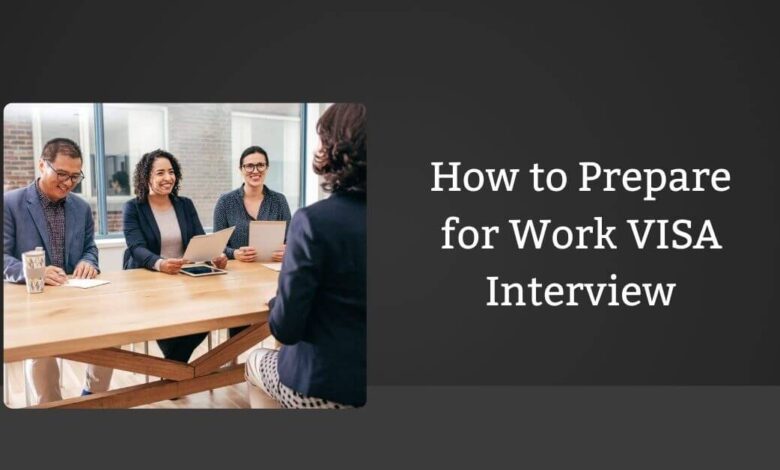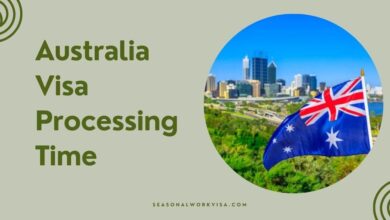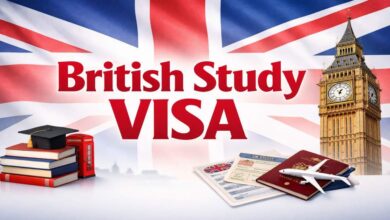How to Prepare for Work VISA Interview – Check Here

The interview for the visa is often the last thing that stands in the way of your plans to study, work, or live abroad. At this very important step, you’ll need to show the visa officer that you are not only qualified but also that you really want to go through with your plans.
It’s important to show facts and numbers, but they might not be enough to make you stand out from other applicants. At this point, stories become very useful.
Understand the Importance of a Compelling Narrative for an Interview!
It’s not just a way to talk to the visa officer; telling a story is a way to connect with them on a personal level. You can make your application stand out, show that you are sincere, and show the visa officer who you are outside of the paperwork by writing an interesting story.
This piece will talk about how to use stories to your advantage in your visa interview. It will break down the main parts of an interesting story and give you tips on how to write and deliver your story with confidence.
Making Your Application Memorable:
When there are a lot of applicants, it can be hard for the person in charge of visas to remember each case. A good story, on the other hand, can stick with you. By telling a story about why you want to travel or move, you turn your application from a list of facts into a personal journey that the visa officer can connect to. This not only makes your application stand out but also makes it more likely that the visa officer will support you.
Creating an Emotional Connection:
People are naturally drawn to stories. A story that is interesting and engaging can make you feel things, help you understand, and build trust. When you talk about your own problems, successes, and hopes, you let the visa officer into your world. This emotional link can help the visa officer understand your position better and be more likely to approve your application.
Presenting Yourself as an Individual:
In the process of getting a visa, it’s easy to feel like just another number. You can help the visa officer see you as a real person with real dreams, goals, and reasons, though, by telling your personal story. This can be especially helpful when the visa worker has to make a decision based on personal information, like whether you want to go back to your home country or how you might help the host country.
Ingredients of Your Narrative for VISA Interview:
Clarity and Conciseness
A good story is clear and gets right to the point. Your story should directly talk about why you want the visa, like whether it’s to study, work, or visit. Leave out details that aren’t important and could take attention away from your main point. Instead, think about the important events and times that best show what drives you and your goals.
Authenticity and Honesty
Being real is very important when writing your story. Tell the truth about your situation and why you want to change. Visa officers are trained to spot lies and embellishments, so it’s important to tell the truth when you talk about your experiences. Being real not only builds trust but also makes your story more believable and understandable.
Relevance and Purpose
Your story needs to be relevant to the type of visa you’re applying for. For instance, if you want to get a student visa, your story should be about your academic goals and how they fit with the area you want to study. When you ask for a work visa, you should talk about your professional accomplishments and how your skills can help the economy of the host country. Always keep the reason you are applying for a visa at the top of your story.
Emotional Connection
Personal stories and experiences are great ways to share a story. They help you connect with the visa officer on an emotional level, which makes your story more interesting and remembered. You could talk about a time when you realized you were really interested in your field of study or a problem you solved that made you want to look for opportunities abroad. These personal touches can make the visa worker care about the applicant and help them understand who they are.
Positive Outlook
A positive attitude is very important for your story. It’s important to be honest about any problems you’ve had, but your story should also make people feel hopeful and excited about the future. Explain how your visa will help you reach your goals and make a good difference in the world, whether you are in your home country or traveling.
Accuracy and Consistency
Lastly, your story needs to be true and match up with the evidence you’ve used. Any differences between what you say in your application and what you say in your story could be seen as suspicious and hurt your trustworthiness. Make sure that all of the numbers, dates, and facts match up with your records by checking them twice.
Read Also: How Many Days Required For Schengen Visa?
How to Craft and Align Your Story for an Upcoming Visa Interview?
Brainstorming
To start writing your story, you need to think of important events and times that show what drives you and what you want to achieve. Plan out why you want the visa and what you want to get out of it. What experiences from your own life have led you to this decision? What problems have you solved? These questions can help you figure out what your story is about.
Structuring Your Story
Stories that are well put together have a start, a middle, and an end. Set the scene by telling them about yourself and your past. Next, talk about the main facts or events that made you want to apply for the visa. Finally, end by talking about your goals and how the visa will help you reach them. This simple structure will help you arrange your ideas and tell a story that flows well.
Practicing Your Delivery
Once you’ve written your story, you need to practice telling it. Practice your story a few times to make sure you can give a smooth, confident answer in the interview. Watch your tone of voice, body language, and eye contact. These nonverbal cues can make your story more powerful. Practicing will also help you see where you need to improve.
Preparing Supporting Evidence
It’s important to back up your story with strong proof, even though stories are powerful. You should be ready to show full trip plans, where you plan to stay, and proof of money to cover your stay in the foreign country. Having all the necessary papers organized and easy to find will show that you are ready and support the truth of your story.
VISA Type Specific Interview Preparations Guidance:
Student Visas
For student visas, your story should focus on your academic goals, why you want to work in that area, and how you plan to make a difference in the future. Give reasons for picking a certain course or school and explain how it fits with your work goals. Make it clear how your schooling will help you make a difference in your country or around the world.
Work Visas
If you want to get a work visa, you should show your professional skills, experience, and accomplishments. Talk about how your skills can help the business of the host country and what you hope to get out of working abroad. If it applies, talk about how this change will help you learn skills that you can use when you get back to your home country.
Tourist Visas
For tourist passes, show that you are genuinely interested in the culture and sights of the host country. Show off your planned itinerary, which should include thorough travel plans and information about where you will stay. To show the visa officer that you really want to go back, you should also show that you have strong ties to your home country, like family, a job, or land.
Family Visas
When you apply for a family visa, stress how important it is to reunite your family and how strong your ties are already. Explain why you want to move to the host country to be with your family and how this will help you and your family.
Common Pitfalls to Avoid in VISA Interviews:
Memorized Responses
It’s good to practice your story, but don’t try to remember every word. When you repeat things over and over, they can sound automatic and fake. Instead, work on getting the main points of your story so that you can talk about them naturally.
Exaggeration or Fabrication
Avoid the temptation to embellish or fabricate information in your narrative. Visa officers are skilled at detecting inconsistencies, and any dishonesty can lead to the rejection of your application. Stick to the truth, and trust that your genuine story is compelling enough.
Negative or Controversial Topics
Do not talk about bad or controversial things that could cause problems during your interview. Instead of dwelling on painful or touchy memories, think about the good things you’ve done and the goals you have for the future.
Overly Emotional or Dramatic
Even though you should show feeling in your story, don’t make it too dramatic. Finding the right mix between being sincere and calm will help you seem real and trustworthy.
Inconsistencies with Documents
As we already said, any differences between what you say and the evidence you use can hurt your trustworthiness. Make sure that everything in your story matches what you wrote on your application.
Conclusion:
A compelling story can make your visa interview much better and help you stand out from other candidates. Crafting a story that is clear, true, and important will make an impression that lasts and show that you are serious about getting the visa. To improve your chances of getting the job, practice your speech, back up your story with proof, and stay away from common mistakes.
Frequently Asked Questions:
Why is telling a story important in a visa interview?
Telling a story helps you connect with the visa officer on a personal level, making your application stand out and showcasing your genuine intent and unique journey.
How can I prepare and practice my story for the interview?
Start by thinking of important events that happened to you and giving your story a clear beginning, middle, and end. Pay attention to your tone of voice, body language, and eye contact as you practice telling your story with confidence. Also, get proof ready to back up what you’re saying.




